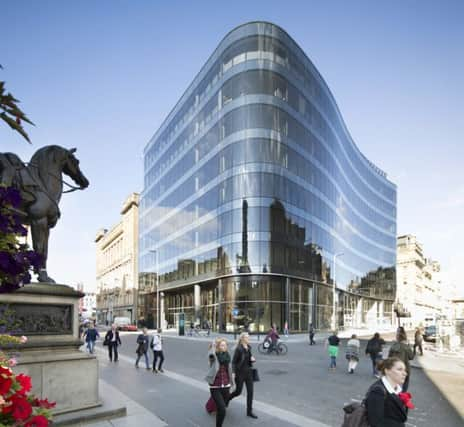Commercial property: Supply shortage hits Glasgow


The take-up of office space in Glasgow surpassed the ten year annual average of 500,000sq ft in the first three quarters of 2016, a 26 per cent uplift on the same three quarters of 2015.
By the end of the year over 800,000sq ft of deals had been completed in the city.
Advertisement
Hide AdAdvertisement
Hide AdBut David Cobban, director in the business space team at Savills Scotland, says that a lack of Grade A space could now have an impact on the market.
He says: “Last year saw the completion of three big buildings but there is nothing else in the pipeline so no high profile speculative building which could attract firms to move from elsewhere.”
Keys deals in Glasgow last year included a 154,814sq ft pre-let to Morgan Stanley at Bothwell Plaza, ACCA taking the remaining 55,744sq ft of accommodation at 110 Queen Street, AXA moving to 49,424sq ft in Cuprum on Cadogan Square and Edrington Group agreeing a new lease on 29,890sq ft at 100 Queen Street.
Cobban says that indigenous demand remains high: “As we enter 2017, the likes of Mott Macdonald, Scottish Courts, Mazars, Wood Group and HMRC are actively looking for almost 400,000sq ft in the city between them.”
He says that consequently supply is diminishing: “As we have roughly only 400,000sq ft of Grade A office accommodation available in Glasgow, of which only 130,899sq ft is classed as ‘new’, the big question is, where will occupiers looking to move go?”
Adding to the supply and demand imbalance in the city is the lack of speculative office development, with no new developments – which would appeal to inward investment – likely until at least 2020, largely due to the uncertain economic and political conditions.
According to Cobban, this has meant that despite strong demand, top Grade A office rents in Glasgow remained flat throughout 2016, at £30 per sq ft.
He says: “It is also having wider implications on Glasgow’s ability to attract companies to relocate, which as a city we are currently struggling to do.”
Advertisement
Hide AdAdvertisement
Hide AdHe points to cities such as Manchester which are benefitting from ”northshoring”– the growing trend for London firms to relocate their operations to northern cities.
He says: “Many of these sorts of firms will be looking for impressive, brand new buildings, but at the moment Glasgow has little to offer.”
For the foreseeable future, according to Cobban, refurbished offices will have to cater for demand. To stand out, landlords should consider best in class refurbishments that are relevant to the needs of the occupier and cater for the demand for “new” space.
He says: “Done well, refurbished accommodation could benefit from rental growth throughout the year.
“We have had political uncertainty to contend with, which is ongoing, but the Commonwealth Games has highlighted the city, as has the success of the Hydro, and Glasgow offers world-class retail.
“We also have the infrastructure, the labour force and expertise in our universities that firms are looking for, but that has to be made clearer to potential commercial investors and developers.”